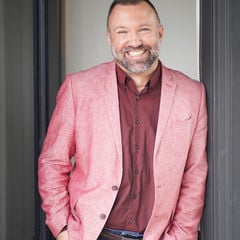There’s a moment, just after the dishes are cleared from an impromptu team lunch in the Lockstep Realty office, when the noise quiets into laughter. The kind that doesn’t feel performative. Agents are mid-conversation—not about contracts or clients, but about last weekend’s Soup Cookoff and who really deserved second place. In the corner, Mia Schulte smiles—not because she organized it (though she did), but because moments like this are why she’s here. Why she stayed. Why others followed.
Mia isn’t the loudest voice in the room. She doesn’t demand attention or label herself a leader. But over time, quietly and consistently, she became a connector—a quiet architect of one of the most magnetic cultures in Central Indiana real estate. One that thrives not on performance metrics alone, but on belief, belonging, and the kind of support that actually shows up when the transaction ends.
The Culture Wasn’t Invented—It Was Lived
When Mia first encountered Lockstep Realty, she didn’t walk in with a pitch or a plan. She was simply paying attention. “I was drawn to Lockstep because of the people and the culture,” she says. “From the outside, I could tell they were doing a lot of business, were creative, and were not afraid to do things their own way.”
That willingness to be different spoke to her—not in a rebellious way, but in a human way. At Lockstep, being real wasn’t just allowed. It was expected. So when she joined, she didn’t just find a place to grow her business—she found space to breathe, to observe, and eventually, to share.
Mia didn’t recruit people in the traditional sense. She didn’t sell the team to others with flashy promises. She simply invited them into something that was working.
The First Domino: Kristen
The first person she brought in was Kristen Nelson—not as an agent, but for an open staffing position. At the time, there were no grand visions of Kristen becoming a central force in Lockstep’s leadership. But her ability to read people, host community, and create cohesion became undeniable. Over time, what began as a support role evolved into something much bigger.
“Creating opportunities for everyone to get out of work mode and be their authentic selves—that’s a non-negotiable,” Kristen says. “Off-site events, in-office parties like our Soup Cookoff… those moments matter.”
And they’re not frivolous. They’re formative.
At Lockstep, professional development doesn’t happen in isolation—it’s woven into the culture. Weekly team meetings aren’t about performance metrics and pressure. They’re about practical growth, shared wins, and roleplay scenarios that sharpen skillsets without sharpening egos.
Kristen, who now plays a major role in agent development, sees it as part of the long game. “We use what’s happening in real time to teach,” she explains. “A great negotiation, a smooth inspection resolution—we break it down in our meetings so others can learn from it.”
According to a 2023 Forbes report, companies with active mentorship cultures have retention rates 50% higher than those that do not. It’s not the information that changes people—it’s the connection. Lockstep figured that out early.
Belief as a Catalyst
Mia’s quiet gift isn’t just noticing people—it’s believing in them before they believe in themselves. That belief changed everything for Elise Carmichael.
“Her leadership style is empowering,” Elise says. “She leads with both heart and strategy. Because of that, I’ve stepped into a more confident version of myself.”
Elise’s past experiences with brokerages were pleasant on the surface, but subtly competitive. “In past brokerages, even if the culture was friendly, there was always this undercurrent of competition,” she says. “Here, it genuinely feels like we’re in it together.”
That shift—from guarded to generous—isn’t accidental. It flows from the top. While Lockstep doesn’t position itself as a “team of leaders,” it does attract agents who thrive under strong relational influence. And for Elise, the result was transformation—not just in volume, but in identity. She grew not because someone micromanaged her, but because someone made room for her.
Culture Without Ego
You can feel it in the way Alec Mason talks about the team. A Handlebar Indy driver with a talent for connecting through conversation, Alec wasn’t looking for someone to tell him how to sell houses. He was looking for a place that wouldn’t force him to become someone he wasn’t.
“Mia brings vision and systems. Elise brings heart and dedication. Kristen brings energy,” Alec says. “They push me in ways that feel supportive, not overwhelming.”
“Zero ego,” he adds. “Everyone shares, supports, and lifts each other up. It feels like being on a team of friends who are also legit good at what they do.”
Kristen likes to say that you can find an “engineer personality sitting next to a musician personality” at any given Lockstep meeting—and she’s not exaggerating. The team is a blend of planners, creatives, analysts, and communicators, each of them bringing a different rhythm to the room.
What binds them isn’t sameness. It’s safety. Agents are expected to bring their full selves into the business—quirks and all. There’s room to experiment, to fail, to try again.
Research from Harvard Business Review supports what Lockstep lives daily: psychologically safe teams—those where members feel accepted and respected—outperform others in both creativity and accountability.
Rituals That Build Trust
While some brokerages rely on sales contests and corporate slogans to foster camaraderie, Lockstep’s culture is built on shared experiences that don’t require an agenda. The annual Client Appreciation Event, for instance, isn’t about prospecting—it’s about showing up for people who’ve trusted the team with life-changing decisions. From planning balloon arches to coordinating food trucks, it’s all hands on deck.
Team photoshoots double as bonding days. Post-event dinners, spontaneous Slack threads celebrating a win, or someone bringing in donuts “just because”—these are the quiet rituals that turn colleagues into community.
Elise recalls one moment when she was having a rough week. “Someone just left a note on my desk with a Starbucks gift card and a ‘You’ve got this.’ That kind of thing doesn’t happen in every office,” she says. “But it does here.”
Owning Mistakes and Learning from Them
There’s a moment in nearly every Lockstep team meeting when someone shares a misstep—a missed call, a bungled negotiation, or a showing that went sideways. And instead of judgment, what follows is insight.
Kristen encourages this kind of vulnerability, not because it’s trendy, but because it works. “We talk about things that didn’t go as expected,” she says. “It creates learning moments that stick more than any training module ever could.”
This environment of open learning reinforces the idea that mistakes aren’t fatal—they’re foundational. In a business that can feel punishing, Lockstep has created a space where people grow from their losses, not just their wins.
The System That Supports the Soul
Lockstep Realty, brokered by eXp Realty, doesn’t just lead with culture—it backs it up with structure. Alec, for example, found consistency through smart systems: drip campaigns, social content, and CRM follow-up strategies designed to reflect his tone and style. “They’ve helped me stay consistent and authentic,” he says.
That blend of support and autonomy isn’t easy to build. Most brokerages tend to lean one way: heavy structure with low flexibility, or full independence with zero scaffolding. Lockstep found a middle ground. The systems are there—but they’re adaptable. What matters most is that the agent feels seen, not slotted.
Kristen, now one of the most integral cultural leaders on the team, sees her role as less about managing and more about unlocking. “My role is really more about supporting the person rather than the transaction,” she says. “Sometimes that means helping them talk through a situation, or working through a mental block. Sometimes it’s just listening.”
It’s the kind of leadership that builds loyalty. It’s no surprise that Lockstep agents don’t just stay—they refer others. Not because they’re told to, but because they want to.
Clients Can Feel It Too
Clients notice it too—even if they can’t always articulate why. Alec recalls a buyer who sent him a message after closing, not just to thank him, but to mention the team. “She said, ‘You always had someone helping you, even if you weren’t there. I felt like I had five agents, not one.’ That meant a lot,” he shares.
According to NAR’s 2024 team performance survey, buyers who worked with integrated agent teams reported 28% higher satisfaction scores, particularly around communication and support.
Kristen sees it in the way clients describe their experiences. “Sometimes a client can’t even put their finger on it, but they feel the confidence that comes from being served by someone who’s part of a well-supported team,” she says.
The Final Thread
For Mia, the legacy she’s helped shape isn’t about numbers or titles. It’s about belonging.
“I’ve formed friendships that I know will last me a lifetime,” she says.
Maybe she didn’t set out to build something. Maybe she just followed what felt real. But what grew from that authenticity—Kristen’s leadership, Elise’s confidence, Alec’s authenticity—wasn’t an accident. It was the result of a thousand small moments done with intention.
She watches now from the edge of another gathering, another lunch, another Tuesday. Someone laughs too loudly. Someone else is retelling a story they’ve told three times before. And Mia, once again, just smiles.
The culture isn’t spoken. It’s felt.



